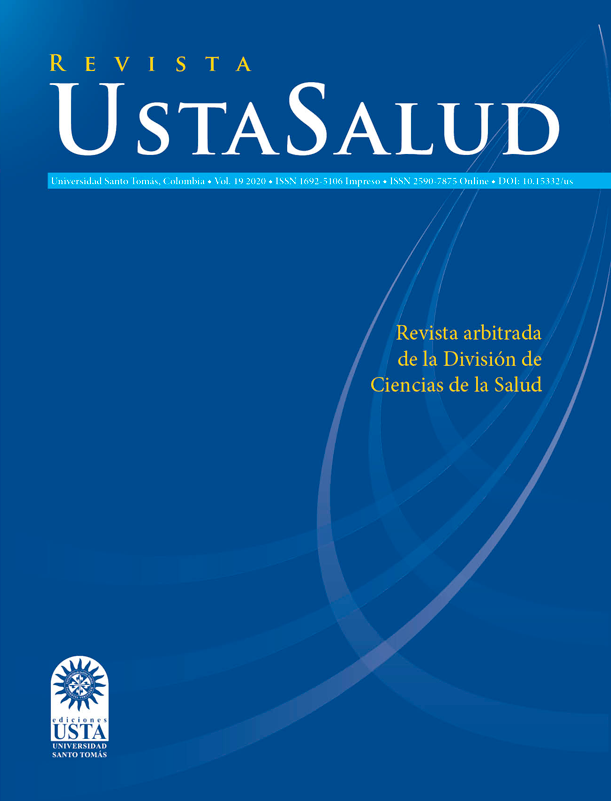Physical activity: a good medicine for our brain
Referencias
1. World Health Organization. Physical Activity. [internet] 2019. [cited October 23rd, 2019] available from https://www.who.int/dietphysicalactivity/pa/en/
2. World Health Organization. Global status report on non-communicable diseases 2014. Geneva: WHO Library Cataloguing-in-Publication Data; 2014.
3. World Health Organization. Global recommendations on physical activity for health. Geneva: WHO Library Cataloguing-in-Publication Data; 2010.
4. World Health Organization. Mental health: a state of well-being [internet] 2019. [cited October 23rd, 2019] available from https://www.who.int/features/factfiles/mental_health/en/
5. Mikkelsen K, Stojanovska L, Polenakovic M, Bosevski M, Apostolopoulos V. Exercise and mental health. Maturitas. 2017; 106:48-56. doi: 10.1016/j.maturitas.2017.09.003.
6. Mayo Clinic. Exercise and stress: Get moving to manage stress [cited October 23rd, 2019] available from https://www.mayoclinic.org/healthy-lifestyle/stress-management/in-depth/exercise-and-stress/art-20044469
7. Leuenberger A. Endorphins, exercise, and addictions: a review of exercise dependence. The Premier Journal for Undergraduate Publications in the Neurosciences. 2006; 3: 1-9.
8. Polo-Kantola P, Laine A, Aromaa M, Rautava P, Markkula J, Vahlberg T, Sillanpää M. A population-based survey of sleep disturbances in middle-aged women--associations with health, health related quality of life and health behavior. Maturitas. 2014;77(3):255-62. doi: 10.1016/j.maturitas.2013.11.008.
9. Mayo Clinic. Depression and anxiety: Exercise eases symptoms [internet] 2019. [cited October 23rd, 2019] available from: https://www.mayoclinic.org/diseases-conditions/depression/in-depth/
depression-and-exercise/art-20046495
10. World Health Organization. Depression Key Facts. [internet] 2020 [cited July 8th, 2020] available from https://www.who.int/en/news-room/fact-sheets/detail/depression
11. Dinas PC, Koutedakis Y, Flouris AD. Effects of exercise and physical activity on depression. Ir J Med Sci. 2011; 180(2):319-325. doi: 10.1007/s11845-010-0633-9
12. Cotman CW, Engesser-Cesar C. Exercise enhances and protects brain function. Exerc Sport Sci Rev. 2002;30(2):75-9. doi: 10.1097/00003677-200204000-00006
13. Ploughman M. Exercise is brain food: the effects of physical activity on cognitive function. Dev Neurorehabil. 2008;11(3):236-40. doi: 10.1080/17518420801997007.
14. Flöel A, Ruscheweyh R, Krüger K, Willemer C, Winter B, Völker K, et al. Physical activity and memory functions: are neurotrophins and cerebral gray matter volume the missing link? Neuroimage. 2010;49(3):2756-63. doi: 10.1016/j.neuroimage.2009.10.043.
15. Cox EP, O’Dwyer N, Cook R, Vetter M, Cheng HL, Rooney K, O’Connor H. Relationship between physical activity and cognitive function in apparently healthy young to middle-aged adults: A systematic review. J Sci Med Sport. 2016;19(8):616-28. doi: 10.1016/j.jsams.2015.09.003.
2. World Health Organization. Global status report on non-communicable diseases 2014. Geneva: WHO Library Cataloguing-in-Publication Data; 2014.
3. World Health Organization. Global recommendations on physical activity for health. Geneva: WHO Library Cataloguing-in-Publication Data; 2010.
4. World Health Organization. Mental health: a state of well-being [internet] 2019. [cited October 23rd, 2019] available from https://www.who.int/features/factfiles/mental_health/en/
5. Mikkelsen K, Stojanovska L, Polenakovic M, Bosevski M, Apostolopoulos V. Exercise and mental health. Maturitas. 2017; 106:48-56. doi: 10.1016/j.maturitas.2017.09.003.
6. Mayo Clinic. Exercise and stress: Get moving to manage stress [cited October 23rd, 2019] available from https://www.mayoclinic.org/healthy-lifestyle/stress-management/in-depth/exercise-and-stress/art-20044469
7. Leuenberger A. Endorphins, exercise, and addictions: a review of exercise dependence. The Premier Journal for Undergraduate Publications in the Neurosciences. 2006; 3: 1-9.
8. Polo-Kantola P, Laine A, Aromaa M, Rautava P, Markkula J, Vahlberg T, Sillanpää M. A population-based survey of sleep disturbances in middle-aged women--associations with health, health related quality of life and health behavior. Maturitas. 2014;77(3):255-62. doi: 10.1016/j.maturitas.2013.11.008.
9. Mayo Clinic. Depression and anxiety: Exercise eases symptoms [internet] 2019. [cited October 23rd, 2019] available from: https://www.mayoclinic.org/diseases-conditions/depression/in-depth/
depression-and-exercise/art-20046495
10. World Health Organization. Depression Key Facts. [internet] 2020 [cited July 8th, 2020] available from https://www.who.int/en/news-room/fact-sheets/detail/depression
11. Dinas PC, Koutedakis Y, Flouris AD. Effects of exercise and physical activity on depression. Ir J Med Sci. 2011; 180(2):319-325. doi: 10.1007/s11845-010-0633-9
12. Cotman CW, Engesser-Cesar C. Exercise enhances and protects brain function. Exerc Sport Sci Rev. 2002;30(2):75-9. doi: 10.1097/00003677-200204000-00006
13. Ploughman M. Exercise is brain food: the effects of physical activity on cognitive function. Dev Neurorehabil. 2008;11(3):236-40. doi: 10.1080/17518420801997007.
14. Flöel A, Ruscheweyh R, Krüger K, Willemer C, Winter B, Völker K, et al. Physical activity and memory functions: are neurotrophins and cerebral gray matter volume the missing link? Neuroimage. 2010;49(3):2756-63. doi: 10.1016/j.neuroimage.2009.10.043.
15. Cox EP, O’Dwyer N, Cook R, Vetter M, Cheng HL, Rooney K, O’Connor H. Relationship between physical activity and cognitive function in apparently healthy young to middle-aged adults: A systematic review. J Sci Med Sport. 2016;19(8):616-28. doi: 10.1016/j.jsams.2015.09.003.
Cómo citar
Rangel Caballero, L., & Murillo López, A. (1). Physical activity: a good medicine for our brain. Ustasalud, 19, 5-6. Recuperado a partir de http://revistas.ustabuca.edu.co/index.php/USTASALUD_ODONTOLOGIA/article/view/2533
Número
Sección
Editorial















